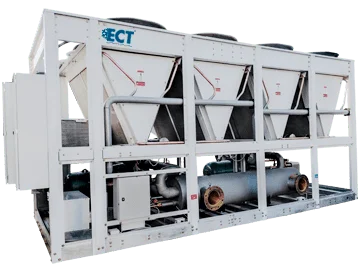How do Chillers Improve the Industrial Process?
Efficiency and precise control of operating conditions are critical to maintaining competitiveness and quality. Chillers, cooling systems that remove unwanted heat, play a crucial role in optimizing industrial processes. From manufacturing to warehousing, chillers help improve efficiency, ensure product quality and reduce operating costs. This article explores how chillers positively impact the industrial process and the key benefits they offer.
Chillers are essential in a variety of industrial processes, providing precise and constant cooling to maintain optimum conditions. Their primary function is to extract heat from a fluid, which is then dissipated through a condenser. This cooling capability is vital for a variety of industrial applications, including:
-
- Temperature Control in Manufacturing Processes
- Refrigeration of Equipment and Machinery
- Maintenance of Stable Environmental Conditions
- Product Quality Optimization

Key Benefits of Chillers in Industrial Processes
-
- Improved Operational Efficiency. Chillers contribute to operational efficiency by maintaining temperatures within an optimal range, allowing equipment and processes to operate at peak performance. Chillers ensure that industrial processes run at constant temperatures, minimizing the risk of fluctuations that could affect product quality. By maintaining the right temperature, chillers help prevent equipment from overheating, prolonging its service life and reducing the need for maintenance.
-
- Product Quality Assurance. In industries such as pharmaceuticals, food and chemicals, product quality depends on maintaining precise temperature conditions. Chillers ensure that products are maintained at stable temperatures during the manufacturing and storage process, ensuring consistent quality. In the food and pharmaceutical industry, maintaining proper temperatures helps prevent the growth of bacteria and other contaminants.
-
- Reduced Operating Costs. Efficient implementation of chillers can result in significant long-term operational savings. Modern chillers are designed to be more energy efficient, reducing electricity consumption and associated costs. By keeping equipment operating within its optimal range, chillers help reduce maintenance frequency and costs.
-
- Productivity Optimization. An efficient cooling system contributes to productivity by keeping processes running without interruption. By preventing overheating and maintaining optimal equipment performance, chillers reduce unplanned downtime. Chillers allow industrial processes to operate at a faster and more consistent pace, increasing production capacity and improving delivery times.
- Compliance with Standards and Regulations. Chillers also help comply with industry standards and regulations that require specific temperature conditions. Chillers comply with environmental regulations by using environmentally friendly refrigerants and technologies that minimize environmental impact. In regulated industries, such as pharmaceuticals and food, chillers ensure that processes meet quality and safety standards.

Considerations When Choosing an Industrial Process Chiller
1. Thermal Load Evaluation. Determining the exact thermal load is crucial for selecting a suitable chiller. Performing a detailed analysis of the cooling needs helps to select the chiller with the correct capacity.
2. Energy Efficiency and Operating Costs. Opting for chillers with high energy efficiency and features that reduce electricity consumption contributes to a significant reduction in operating costs.
3. Space and Configuration Requirements. Consider the available space and configuration of the facility to ensure that the chiller will fit properly and operate efficiently.
4. Regulatory Compliance. Choosing a chiller that complies with industry standards and regulations ensures that the system operates within the required quality and safety standards.
Chillers play a crucial role in improving industrial processes by providing precise and efficient cooling. From optimizing operational efficiency and product quality to reducing operating costs and meeting regulatory compliance, chillers offer significant benefits for a wide range of industrial applications. By considering factors such as cooling capacity, energy efficiency, and specific process requirements, companies can select the right chiller to improve their operations and stay competitive in an ever-changing industrial environment.
